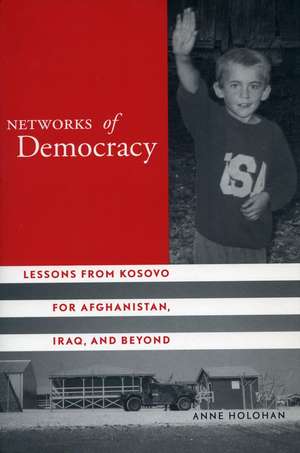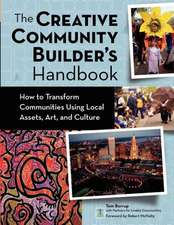Networks of Democracy: Lessons from Kosovo for Afghanistan, Iraq, and Beyond
Autor Anne Holohanen Limba Engleză Paperback – 12 apr 2005
In 1999, the United Nations embarked on a massive intervention in Kosovo. This book compares the fate of two adjacent municipalities two years into that intervention. Though similar in all key respects, by 2001 the municipalities were headed down markedly different paths—one making progress toward institution-building, democratization, and reconstruction, the other stagnating.
Drawing on extensive field research, the author shows that the successful municipality was able to bring together international organizations and local populations as part of a “network” organization. The lack of progress in the second municipality was due to the same organizations staying behind bureaucratic walls, and keeping local populations at a distance. In both municipalities, information and communication technologies contributed in surprising ways to the success or failure of the international efforts.
This book has relevance for interventions around the world, most obviously for the challenging situations in Afghanistan and Iraq, and the author develops policy recommendations in the concluding section. No other book on nation-building or democratization examines the daily behavior in an international intervention to answer the big question: How do you get from the chaos of a post-conflict society to one with functioning institutions?
Drawing on extensive field research, the author shows that the successful municipality was able to bring together international organizations and local populations as part of a “network” organization. The lack of progress in the second municipality was due to the same organizations staying behind bureaucratic walls, and keeping local populations at a distance. In both municipalities, information and communication technologies contributed in surprising ways to the success or failure of the international efforts.
This book has relevance for interventions around the world, most obviously for the challenging situations in Afghanistan and Iraq, and the author develops policy recommendations in the concluding section. No other book on nation-building or democratization examines the daily behavior in an international intervention to answer the big question: How do you get from the chaos of a post-conflict society to one with functioning institutions?
| Toate formatele și edițiile | Preț | Express |
|---|---|---|
| Paperback (1) | 158.52 lei 3-5 săpt. | |
| Stanford University Press – 12 apr 2005 | 158.52 lei 3-5 săpt. | |
| Hardback (1) | 614.94 lei 6-8 săpt. | |
| Stanford University Press – 12 apr 2005 | 614.94 lei 6-8 săpt. |
Preț: 158.52 lei
Nou
Puncte Express: 238
Preț estimativ în valută:
30.33€ • 31.34$ • 25.23£
30.33€ • 31.34$ • 25.23£
Carte disponibilă
Livrare economică 26 februarie-12 martie
Preluare comenzi: 021 569.72.76
Specificații
ISBN-13: 9780804751919
ISBN-10: 0804751919
Pagini: 240
Dimensiuni: 152 x 229 x 13 mm
Greutate: 0.32 kg
Ediția:1
Editura: Stanford University Press
Colecția Stanford University Press
ISBN-10: 0804751919
Pagini: 240
Dimensiuni: 152 x 229 x 13 mm
Greutate: 0.32 kg
Ediția:1
Editura: Stanford University Press
Colecția Stanford University Press
Recenzii
"Holohan provides a conceptually elegant and yet remarkably practical analysis of democratization and reconstruction efforts in two municipalities in Kosovo, some two ears after the launch of the United Nations post-conflict mission there in 1999."—Contemporary Sociology
"Throughout the case studies, Holohan relentlessly pushes her theoretical points, while seamlessly weaving the theoretical aspects of network organizations into the specific discussions of the municipalities . . . Networks of Democracy undoubtedly provides important lessons for international interventions, both present and future."—Yale Journal of International Law
"Anne Holohan brings something long overdue to the democratization bookshelf: comparative case studies based on fieldwork. This book should be mandatory reading for all Washington, D.C. policymakers at work on spreading democracy."—Julie Mertus, American University
"With unique access to all levels of nation-building organizations, Anne Holohan gives an original and exceptional analysis of the process. This book will become a classic on how to enhance international cooperation and democratization missions."—Charles Moskos, Northwestern University
"[M]y students have read Networks of Democracy, as should all who are interested in the theory and practice of peace building and international conflict intervention."—American Journal of Sociology
Notă biografică
Anne Holohan received a Ph.D. in sociology from the University of California, Los Angeles. She is currently a Marie Curie International Incoming Fellow at the University of Trento, Italy.
Textul de pe ultima copertă
“Anne Holohan brings something long overdue to the democratization bookshelf: comparative case studies based on fieldwork. This book should be mandatory reading for all Washington, D.C. policymakers at work on spreading democracy.”—Julie Mertus, American University
“With unique access to all levels of nation-building organizations, Anne Holohan gives an original and exceptional analysis of the process. This book will become a classic on how to enhance international cooperation and democratization missions.”—Charles Moskos, Northwestern University
“With unique access to all levels of nation-building organizations, Anne Holohan gives an original and exceptional analysis of the process. This book will become a classic on how to enhance international cooperation and democratization missions.”—Charles Moskos, Northwestern University
Descriere
In 1999, the United Nations embarked on a massive intervention in Kosovo. This book compares the fate of two adjacent municipalities two years into that intervention. Though similar in all key respects, by 2001 the municipalities were headed down markedly different paths—one making progress toward institution-building, democratization, and reconstruction, the other stagnating.














